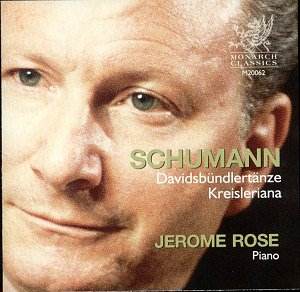This is not hot off
the press – it was recorded in 2001
– but it does form part of Monarch Classic’s
Jerome Rose series. This has provided
enlightening equally to admirers of
the American pianist and to those for
whom Rose’s name is not so familiar.
He proves powerful in Beethoven and
Liszt, maybe somewhat less impressive
in Chopin, but fine generally in Schumann.
One gets the impression that Rose is
seen as an analytic player, a disciple
of Serkin, and one who abjures sentiment
or affectionate gesture. This is avowedly
not the case but he does possess a cool
toughness, allied to commanding resources,
and some may find him sometimes a touch
aloof in his Schumannesque responses.
That said Davidsbündlertänze
is certainly impressive. Lebhaft from
the First Book isn’t explicitly romanticized;
we recognise from this Rose’s priorities
– an avoidance of textual clutter and
a promotion of clarity of passagework
and finger work. He doesn’t draw on,
or summon up, great reserves of tonal
warmth rather relying on clear pointing
to make his point. There’s fine
articulation in the third of the same
book and a witty hauteur as well (he’s
never an unsmiling Schumann player).
He keeps No.5 Einfach forwardly
moving though it’s sensitively shaped
and he reserves greatest tonal and expressive
weight for No.7 (Nicht schnell).
Similarly in the second book there’s
jauntiness to the wittily phrased No.12
(Mit Humor) and a delightful
swinging legato simplicity to No.14
(Zart und singend). In Book II
one finds a greater use of pedal and
tonal weight in No.17 (Wie aus der
Ferne).
It’s probably unrealistic
to judge his Kreisleriana against that
of a known monarch of Schumannesque
individualism such as Horowitz but comparison
is effective in underscoring Rose’s
more reserved and equable personality.
The first piece lacks just that level
of left hand incursion that Horowitz
makes – at the same basic tempo – but
no one could accuse Rose of dullness.
Next to Horowitz he can sound a little
detached in the slow movements – my
impression is brisk and businesslike
in the second piece Sehr innig und
nicht zu rasch; Rose certainly obeys
the second injunction but I don’t sense
too much of the former. But though he
may appear softer grained and rather
non-committal he can certainly shape
lines with the best and cultivates a
certain craggy wit, as opposed to Horowitz’s
capricious lightness, in the fifth.
I admire the faster and crustier movements;
find the slower ones rather aloof.
What still bothers
me about a number of Monarch Classics’
Rose recordings is the clinical, clangourous
sound. This has been something of a
consistent feature of the series and
it’s not to the pianist’s advantage.
Excellent notes though, by Stephen Wigler.
Jonathan Woolf

![]() Jerome Rose (piano)
Jerome Rose (piano) ![]() MONARCH CLASSICS M20062 [70.45]
MONARCH CLASSICS M20062 [70.45]